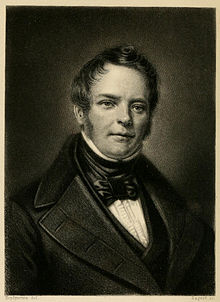Karl Gottlob Zumpt

Karl or Carl Gottlob Zumpt (Latin: Carolus Timotheus Zumpt; 20 March 1792 – 26 June 1849) was a German classical scholar known for his work in the field of Latin philology.
Life
[edit]Karl Gottlob Zumpt was born at Berlin on 20 March 1792.
Educated at Heidelberg and Berlin, he was from 1812 onward, a schoolteacher at Friedrich Werder Gymnasium in Berlin. In 1821 he transferred as a professor to the Joachimsthal Gymnasium, also in Berlin. In 1827 he was appointed professor of classical philology at the University of Berlin.[1]
His chief work was his "Latin Grammar" ("Lateinische Grammatik"", 1818), which stood as a standard work until superseded by Johan Nicolai Madvig's textbook in 1844 (In Danish: "Latinsk Sproglære til Skolebrug").[2] He edited Quintilian's "Institutio Oratoria" (Volume 5, 1829, a project started by Georg Ludwig Spalding),[3] as well as works by Quintus Curtius Rufus and Cicero:
- "Q. Curtii Rufi De gestis Alexandri Magni, regis Macedonum, libri qui supersunt octo by Quintus Curtius Rufus", 1826.
- "M. Tullii Ciceronis Verrinarum libri septem", 1830.
- "M. Tullii Ciceronis de officiis libri tres. Ad optimorum exemplarium sidem recensiti", 1837.[4]
Otherwise, he primarily devoted his time and efforts to Roman history, publishing "Annales veterum regnorum et populorum" (3rd ed. 1862),[5] a work in chronology down to 476 AD, and other antiquarian studies.[6]
He was the uncle of August Wilhelm Zumpt.[4]
References
[edit]- ^ List of works Berlin, 2002
- ^ WorldCat Title Latinsk Sproglære til Skolebrug
- ^ Gustav Emil Lothholz (1900), "Zumpt, Gottlob", Allgemeine Deutsche Biographie (in German), vol. 45, Leipzig: Duncker & Humblot, pp. 481–484
- ^ a b Chisholm 1911.
- ^ WorldCat Identities Most widely held works about Karl Gottlob Zumpt
- ^ One or more of the preceding sentences incorporates text from a publication now in the public domain: Chisholm, Hugh, ed. (1911). "Zumpt". Encyclopædia Britannica. Vol. 28 (11th ed.). Cambridge University Press. p. 1056.
External links
[edit]- Works by Karl Gottlob Zumpt at Project Gutenberg
- Works by or about Karl Gottlob Zumpt at the Internet Archive
- Life and works by A. W. Zumpt (in Latin)
- A list of works (51 entries): Padelletti, Guido (1878–1879). "Anhang — Verzeichniss der Werke von Carl Gottlob und August Wilhelm Zumpt — C. G. Zumpt". Jahrbücher für classische Philologie (in German). 10. Supplementband. Leipzig: 198–202. Retrieved 2012-01-28.
- List of works Berlin, 2002
- 1792 births
- 1849 deaths
- German classical scholars
- German philologists
- Members of the Prussian Academy of Sciences
- Writers from Berlin
- People from the Margraviate of Brandenburg
- Heidelberg University alumni
- Humboldt University of Berlin alumni
- Academic staff of the Humboldt University of Berlin
- German male writers
